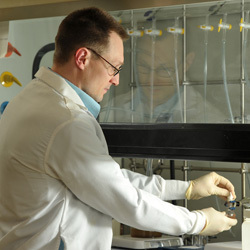

The National Science Foundation has funded an International Research Experiences for Students (IRES) program that will support 12 Notre Dame Ph.D. students to do research at any of three laboratories in Sweden. Paul Helquist, associate chair for research in the Department of Chemistry and Biochemistry, is principal investigator for the project. The award is for nearly $250,000.
Each year for three years, four students will spend four summer months conducting research in the area of developing new enantioselective catalysts. “Enantioselective synthesis is especially important for making pharmaceuticals that have exactly the correct three-dimensional shape to interact properly with enzymes and other components of cells,” Helquist says. The research also has application in such fields as agricultural compounds and small molecule probes in molecular biology and biochemistry.
The research could impact dissertation projects in synthetic organic chemistry, inorganic chemistry, organometallic chemistry, analytical chemistry, materials science, biochemistry, or molecular biology. The work blends computational studies with experimental chemistry and the tools of molecular biology to develop new transition metal- and peptide-based enantioselective catalysts.
Students will study with world leaders in the development of computational methods for prediction of enantioselectivities of chiral transition metal catalysts, the development and characterization of new metal catalysts, the evaluation of catalyst performance, and the use of molecular biology methods to develop new peptide-based catalysts. Collaborators are Per-Ola Norrby at Gothenburg University, Pher Andersson at Stockholm University, and Jan-Erling Bäckvall at Stockholm University.
“The collective IRES experience will prepare the participants for careers in an increasingly competitive technological world in which scientists are expected to have multiple skills and to succeed in an international setting,” Helquist says. “Moreover, students will be personally enriched from immersion in a different scientific and societal culture.”